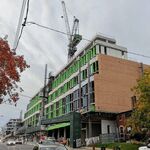Highrise sales set records in 2011, but what lies ahead? (the Toronto Star)
December 30, 2011
Ryan Starr
From left, Marco Filice, Liberty Developments, Jim Ritchie of Tridel, Andrew Hoffman from CentreCourt Developments, Peter Freed of Freed Developments, Danny Roth of Brandon Communications, Riz Dhanji of Canderel Residential, Mimi Ng from Menkes, and Paul Golini of Empire Communities discuss the state of the industry at a Toronto Star board table.
Keith Beaty/Toronto Star
“The best year ever, right?” developer Peter Freed asked upon hearing the 2011 sales totals for Toronto’s condo market.
Indeed it was the best year on record for highrise sales. According to RealNet Canada, 27,224 condos were sold between January and November. The previous sales record from 2007 was surpassed at the end of October.
Meanwhile, GTA home prices in November hit a record average of $481,305, almost 10 per cent more than the average home was worth a year ago, according to the Canadian Real Estate Association.
Earlier this month Freed, president of Freed Developments, joined with half a dozen of the city’s other key real estate players for a Toronto Star-sponsored roundtable.
The discussion — moderated by Brandon Communications president Danny Roth — reflected on the year that was in real estate and looked ahead to 2012.
“How do you explain it?” Roth asked the roundtable, referring to Toronto’s bustling condo market.
“We have an immigration policy that drives the need for housing,” noted Andrew Hoffman, president of CentreCourt Developments.
“And you think back over the last 30 years there’s been no purpose-built rentals in this market. So that’s a huge driver for demand, plus low interest rates and the affordability of condos. All those factors drive the continued growth.”
Bad news bears
So why do economists and analysts continue to predict the imminent collapse of the Toronto condo market?
“Bad news sells papers better than good news,” suggested Mimi Ng, vice president of sales and marketing for Menkes Developments.
“We can all agree there’s a disconnect between our industry and these pundits who try and predict how this thing goes forward,” added Jim Ritchie, Tridel’s vice president of sales and marketing. “They don’t know the nuances of this industry.”
Paul Golini, executive vice president of Empire Communities and current head of the Building and Industry and Land Development Association (BILD), said the chatter is “fear mongering” that’s based on inaccurate comparisons with what’s happened in the U.S.
“The fact is, there are tangible real differences between that and what’s taking place in the GTA market,” he said, citing Canada’s tighter lending rules as one. “There’s an array of differences that aren’t talked about often enough.”
Size matters
One thing that is talked about a lot — the shrinking size of downtown condo suites.
“Our average unit size has fallen considerably from four or five years ago,” noted Riz Dhanji, vice president of sales and marketing for Canderel Residential.
“The concern is we’re all building the smaller units to hit a price point, but at some point there’s that move-up buyer that doesn’t want to live in 500 square feet. So we need to have some larger product.”
Hoffman argued that downtown buyers don’t mind living in smaller condos. “They’re living active lives, they’re spending time at work, they’re out at restaurants and sporting events, and if they do entertain they’re usually not doing it in their home; they’re doing it at other venues or in the amenity space provided by the condo.”
The way units are designed these days makes it easier to live comfortably in smaller spaces, he added. “The functionality of design has improved tremendously in recent years.”
Family matters
Trinity-Spadina Councillor Adam Vaughan, whose ward is condo-construction central, is taking proactive steps to ensure larger suites are built downtown.
He would like to see all condo buildings in his ward include 10 per cent “family-size” units — either three-bedroom suites or two smaller units that can be converted into a three-bedroom suite, typically via knockout panels.
The goal of supplying family-sized condos is admirable, the roundtable agreed. Problem is, larger suites are often the last to sell and are considerably more expensive — well north of $500,000 downtown.
“It boils down to how much does it cost, and is a typical family willing to spend that kind of money for a condo in the core in the city,” Ritchie said.
“The trick is coming up with something that is affordable in a proper size that will work as a three-bedroom (suite).”
Glass houses
There was lots to talk about this summer when glass began falling off condo towers downtown. How did this PR nightmare impact the developers, Star real estate editor Gale Beeby wondered.
“I think it’s fair to say the attention has elevated the focus of developers and their consultants,” Hoffman said. “Wind was a big factor not appropriately factored into the design elements. So certainly the consulting industry (will now be) focused on those details before moving forward with any contracts.”
Transit toll
In the 905, condo suites may be more spacious and glass might remain on the buildings, but transit — or lack of it — is a serious concern for builders
In accordance with the province’s Places to Grow policy, developers are transitioning from lowrise construction to mixed-use, highrise condo developments.
“I think Highway 7 has the potential to be the new Yonge St.,” Marco Filice, vice president of Liberty Development, told the roundtable.
With all the mixed-use projects planned along Highway 7, the lower portion of York Region — Vaughan, Richmond Hill and Markham — could develop the same population density as North York’s Yonge corridor, Filice said.
Just one major hitch — “severely underfunded” transit.
Mix it up
Back downtown, the growth in mixed-use developments is changing the way we live, Golini pointed out.
“We’re looking at a new model where urban retail, residential and commercial are together. You’re seeing the big grocery stores and the big box stores change their model, whether it’s Home Depot or Wal-Mart.
“They’re coming up with a smaller format that fits into the podium component of our condo communities.”
Dhanji noted that at Aura, Canderel’s iconic condo project at Yonge and Gerrard Sts..., there will be 180,000 square feet of commercial space with tenants that include U.S. retailers Bed Bath & Beyond and Marshalls.
“They see the need to be able to get strong retail in the downtown core and adjust their model for smaller (floor)plates to be able to get into that space.”
“I think we’re going to see more of that,” Golini said. “I don’t think it’s just a trend. It’s more of what needs to be done.”
Looking ahead
Speaking of trends, if 2011 was a record year for condo builders, what does 2012 hold in store?
“I might be so bold as to say we’ll hit the same highrise numbers we hit this year just based on what’s in the pipeline and the momentum that’s going to carry over from 2011 to 2012,” Golini told the roundtable. Though he cautioned that things could slow down in a couple of years, when soaring land prices begin to impact the affordability of condo projects.
At the moment, though, Freed isn’t seeing signs of a slowdown. King West’s condo king said he’s planning to launch 3,000 units over the next 18 months, expanding beyond his domain to do projects on King East, in Yorkville and at Yonge and Eglinton.
“We agree with the optimism around the table,” he said as the roundtable wrapped up. “We’re excited.”
What’s on tap
Looks like a busy year ahead for some of T.O.’s major condo builders:
• Canderel Residential: Condo tower planned for Yonge and Grenville;
www.canderel.com/residential
• CentreCourt Developments: Building Peter Street Condos and Karma Condos, and a new downtown project to be announced;
www.centrecourtdevelopments.com
• Empire Communities: Eau Du Soleil, 1,500-unit project at Lake Shore Blvd. W. and Marine Parade Dr.;
www.empirecommunities.com
• Freed Developments: 3,000 units over the next 18 months; sites on Colborne St. (King and Church), Yorkville, Yonge and Eglinton, Bathurst and Front;
www.freeddevelopments.com
• Liberty Development: Building World on Yonge: four residential highrise towers, office complex with hotel facilities, retail centre and park;
www.libertydevelopment.ca
• Menkes Developments: Fabric Condos: 180-unit project at Richmond and Spadina; 365 Church Condos (Church and Carlton); large mixed-use project at Harbour and York;
www.menkes.com
• Tridel: Ten York, proposed 75-storey tower at Harbour and York;
www.tridel.com



